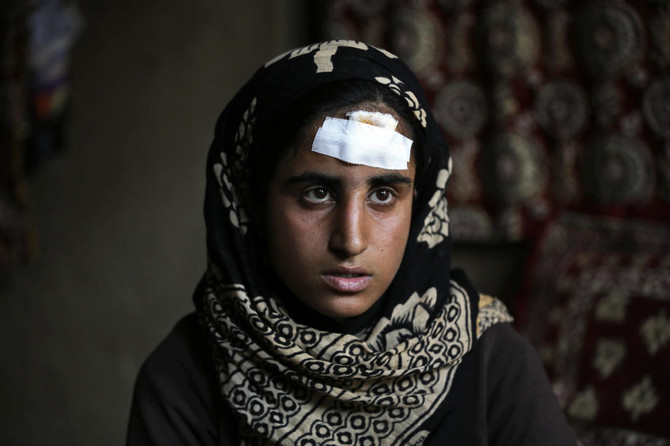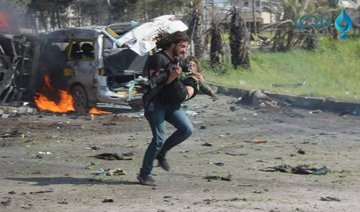SRINAGAR: He was documenting a protest by dozens of Kashmiri students confronting armed Indian government forces wearing riot gear. But when an 18-year-old was hit in the head and began bleeding profusely, the Associated Press photographer put down his camera and rushed in to help her.
"It was an instant decision, and I didn't think twice," Dar Yasin said. He explained that he was closest to the woman and so best able to help. "I gave my camera to a colleague. ... I took the injured girl in my arms."
The scene soon became chaotic. Other protesters became angry when they saw the woman bleeding and hurled stones at the police and paramilitary soldiers, who retaliated with tear gas.
Yasin carried Khushboo Jan away from the protest site in Kashmir's main city of Srinagar, and urged her anxious friends not to worry. "I told the girl protesters that I have two daughters," he said.
The effort was captured by another photographer who then helped Yasin load Jan into a car that had been pulled up by a civilian to take her to a hospital.
"When I saw Yasin helping the girl, I thought I should document it and clicked some shots," said the other photographer, Faisal Khan, from the Turkish news organization Anadolu Agency.
Yasin and Khan then resumed taking photographs of the protest. Jan received six stitches on her forehead before being sent home from the hospital later that day.
The students demonstrating Thursday had been protesting a police raid on a college less than two weeks earlier in the town of Pulwama, in the Indian-governed portion of the disputed and divided Himalayan region. Another part of Kashmir is administered by Pakistan, and both anti-India rebels and protesters often demand that the Indian portion be allowed to join Pakistan or be granted independence.
Police released a brief statement after Thursday's protest saying Jan had been hurt in a stone-throwing incident, referring to a common practice by protesters of hurling bricks and stones at police and paramilitary troops. Jan said, however, that she had been hit by a marble fired from a sling by a soldier in a nearby bunker. Marbles are often used by Indian forces as ammunition used against protesters.
"Later, my friends told me that I was rescued by some media persons," Jan told the Associated Press on Sunday, as Yasin visited her in her Srinagar home.
Tensions between Kashmiri students and Indian law enforcement have escalated since April 15, when government forces raided the college in Pulwama, about 30 kilometers (19 miles) south of Srinagar. Hundreds of students tried to resist the raid, sparking clashes that left at least 50 students injured. Authorities have not explained what they were searching for or targeting in that raid.
On April 17, students rose up again in protests across the region that left more than 100 students and an unknown number of police officers injured. Authorities responded by closing colleges, universities and some high schools, but the protests have continued.
On Monday, as authorities ordered schools and colleges open, protests and clashes again erupted in Srinagar. Police fired tear gas and used water cannons to stop rock-throwing students from marching in the main commercial area in Srinagar.
The students were chanting slogans such as "Go India, go back" and "We want freedom." Some students were reported injured in the clashes.
Protest violence is an almost daily occurrence in Kashmir, where anti-India sentiment runs deep among the mostly Muslim population after decades of military crackdown in the mountainous territory to fight armed rebellion. The region, claimed by both India and Pakistan in its entirety, has sparked two of three wars between the nuclear-armed nations since 1947.
Kashmir has also seen more than 70,000 people die since 1989 in a homegrown rebellion and the ensuing Indian crackdown, which has suppressed militant groups in recent years.
AP journalist covering Kashmir protest helps injured teen
AP journalist covering Kashmir protest helps injured teen

Shooter kills 9 at Canadian school and residence

- The shooter was found dead with an apparent self-inflicted gunshot wound
- A total of 27 people were wounded in the shooting, including two with serious injuries
TORONTO: A shooter killed nine people and wounded dozens more at a secondary school and a residence in a remote part of western Canada on Tuesday, authorities said, in one of the deadliest mass shootings in the country’s history.
The suspect, described by police in an initial emergency alert as a “female in a dress with brown hair,” was found dead with an apparent self-inflicted gunshot wound, officials said.
The attack occurred in Tumbler Ridge, British Columbia, a picturesque mountain valley town in the foothills of the Rockies.
A total of 27 people were wounded in the shooting, including two with serious injuries, the Royal Canadian Mounted Police said in a statement.
Prime Minister Mark Carney said he was “devastated” by the “horrific acts of violence” and announced he was suspending plans to travel to the Munich Security Conference on Wednesday, where he had been set to hold talks with allies on transatlantic defense readiness.
Police said an alert was issued about an active shooter at Tumbler Ridge Secondary School on Tuesday afternoon.
As police searched the school, they found six people shot dead. A seventh person with a gunshot wound died en route to hospital.
Separately, police found two more bodies at a residence in the town.
The residence is “believed to be connected to the incident,” police said.
At the school, “an individual believed to be the shooter was also found deceased with what appears to be a self?inflicted injury,” police said.
Police have not yet released any information about the age of the shooter or the victims.
“We are devastated by the loss of life and the profound impact this tragedy has had on families, students, staff, and our entire town,” the municipality of Tumbler Ridge said in a statement.
Tumbler Ridge student Darian Quist told public broadcaster CBC that he was in his mechanics class when there was an announcement that the school was in lockdown.
He said that initially he “didn’t think anything was going on,” but started receiving “disturbing” photos about the carnage.
“It set in what was happening,” Quist said.
He said he stayed in lockdown for more than two hours until police stormed in, ordering everyone to put their hands up before escorting them out of the school.
Trent Ernst, a local journalist and a former substitute teacher at Tumbler Ridge, expressed shock over the shooting at the school, where one of his children has just graduated.
He noted that school shootings have been a rarity occurring every few years in Canada compared with the United States, where they are far more frequent.
“I used to kind of go: ‘Look at Canada, look at who we are.’ But then that one school shooting every 2.5 years happens in your town and things... just go off the rails,” he told AFP.
‘Heartbreak’
While mass shootings are extremely rare in Canada, last April, a vehicle attack that targeted a Filipino cultural festival in Vancouver killed 11 people.
British Columbia Premier David Eby called the latest violence “unimaginable.”
Nina Krieger, British Columbia’s minister of public safety, said it was “one of the worst mass shootings in our province’s and country’s history.”
The Canadian Olympic Committee, whose athletes are competing in the 2026 Winter Games in Italy, said Wednesday it was “heartbroken by the news of the horrific school shooting.”
Ken Floyd, commander of the police’s northern district, said: “This has been an incredibly difficult and emotional day for our community, and we are grateful for the cooperation shown as officers continue their work to advance the investigation.”
Floyd told reporters the shooter was the same suspect police described as “female” in a prior emergency alert to community members, but declined to provide any details on the suspect’s identity.
The police said officers were searching other homes and properties in the community to see if there were additional sites connected to the incident.
Tumbler Ridge, a quiet town with roughly 2,400 residents, is more than 1,100 kilometers (680 miles) north of Vancouver, British Columbia’s largest city.
“There are no words sufficient for the heartbreak our community is experiencing tonight,” the municipality said.















